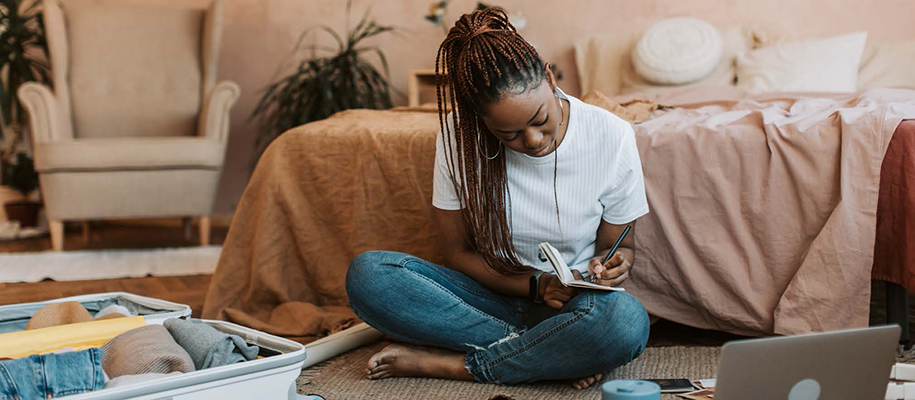Studying abroad is a once-in-a-lifetime opportunity for most students, so you want to do it right and be prepared for anything that comes your way. Once you finish the process of applying to your study abroad program and find out you’ve been accepted, the main thing to do next is research the country you're headed to so you can determine what to pack. While there are many basic packing lists available online, below is a list of 10 essential items you should also bring in addition to your everyday necessities.
1. Immune system supplements
Going to a new place can be hard on your immune system, so one method to prevent sickness is to drink an immune system supplement such as Airborne or Emergen-C. While these are not 100% effective, many people take them before flying or as soon as they feel symptoms of a cold. All you need is some water and the tablets dissolve quickly.
Related: A Helpful Checklist to Manage Your Health in College
2. Mini umbrella
No matter what season you study abroad, it’s likely it will rain at least once during your program. Instead of bringing a giant umbrella that’s heavy and takes up lots of space in your suitcase, try to bring one that’s small enough to fit in your backpack or purse. You’ll appreciate having an umbrella when it suddenly starts raining and everyone else frantically tries to find somewhere to buy one.
3. Photos of your life back home
While almost everyone has a number of photos on their smartphone, it might be a good idea to print photos of your family, school, friends, special life events, etc. to share with your new community. You may also want to bring extra copies of photos to leave with your host family or friends as a way for them to remember you.
4. Stationary supplies
Writing hand-written notes for people’s birthdays or thank-you notes at the end of your program is a sweet way to convey your gratitude and all that you have learned during your stay. If you aren’t good at making hand-crafted letters, there’s always cheap stationery available at dollar or craft stores.
Related: Why Every College Student Should Keep a Planner
5. Toiletry essentials not found abroad
These include specific medicines or brands of products you absolutely have to take that are not available in your study abroad country or not easily delivered. Because it’s not always practical to take a semester or year’s worth of something with you, you should research what can or can’t be purchased abroad and only take things you need. Remember, part of studying abroad is being able to try new products not available in your own country!
6. Business clothing
Many study abroad programs offer internship experiences or chances to connect with potential employers, so it’s wise to bring at least one business casual outfit. Students should research business formality of the culture in which they’re studying abroad before purchasing a complete set of new clothing. In general, it’s better to be too formal than underdressed.
7. Outlet adapters and extra chargers
There’s nothing worse than being a Millennial and not being able to use your electronics! Depending on where you’re going, an adapter is necessary in order to use most gadgets (e.g., phone, computer, hair straightener). And a portable power bank can come in handy on day trips when you’ve drained your cell phone battery and can’t find an outlet. These items can be purchased online or at electronics stores at affordable prices.
Related: The Quick, Essential Packing List for Studying Abroad
8. Gifts for your host family, program coordinators, and teachers
While gift-giving traditions vary in each culture, giving a small token from your hometown to your host family, program coordinator, and teachers at the beginning or end of your study abroad program is a nice way to show your appreciation. Some gift ideas include local products produced in your state, toys for your host siblings, or some of your favorite items, to name a few.
9. Copies of important documents
These include a scanned copy of your passport, international insurance plan, prescriptions (e.g., medical and vision), emergency contact information, and so on. Just because we all have smartphones that usually carry these pieces of information doesn’t mean those devices won’t fail. It’s always a good idea to have a backup plan. Keep these documents in a thin folder in your carry-on and leave it in a safe space when you arrive at your final destination.
10. Emergency money
Emergency cash should be kept on you at all times, in a separate place from your usual spending money to avoid temptation. While the amount will differ depending on local prices, at least the equivalent of $50 should cover most day-to-day situations, like not having enough money for the local subway or running out of lunch money. College students should plan whether to obtain their country’s local currency before or after arriving in the country.
Related: 7 Helpful Money–Saving Habits College Students Should Learn
Your study abroad journey will be a transformative experience, but proper preparation is key to making the most of your time abroad. By packing thoughtfully and including the essentials outlined here, you'll set yourself up for comfort and success. Ultimately, studying abroad is as much about personal growth as it is about academics—so pack your sense of adventure and curiosity along with all the essential items in your suitcase. Safe travels and enjoy the journey of a lifetime!





